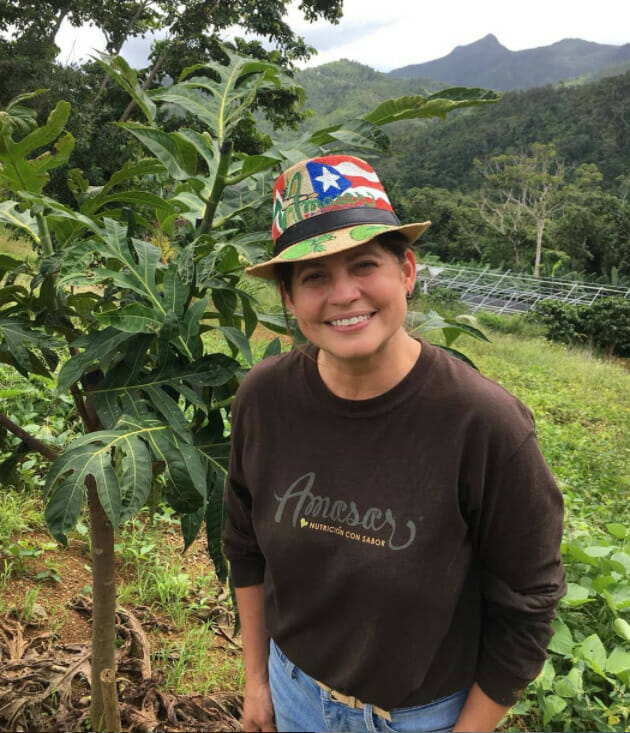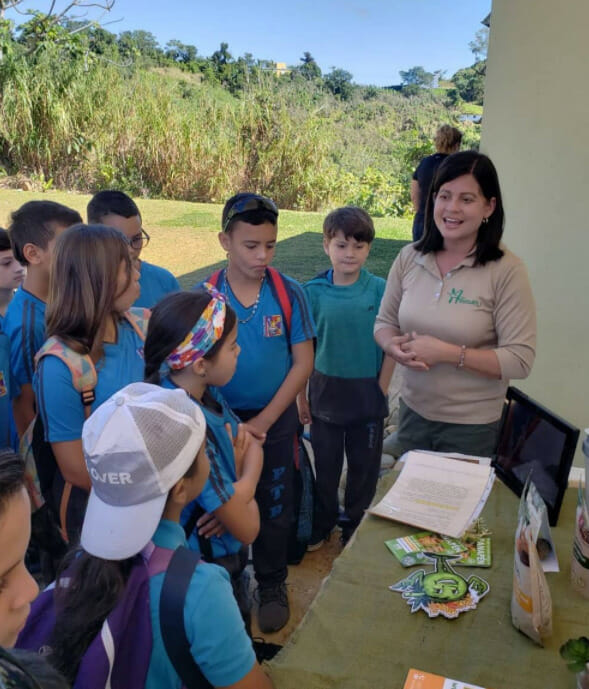“I dare you to begin. And to connect with other dreamers in action.” —Marisol Villalobos, founder of Amasar
Marisol Villalobos, founder of Amasar, Puerto Rico
2021 WE Empower Finalist, Latin America & the Caribbean
Marisol Villalobos discusses her regenerative agribusiness, spotlighting the bountiful Breadfruit and its impressive nutritional qualities that help support local food security, along with empowering farmers in Puerto Rico to promote a dignified way of life. As told to WE Empower contributing author, Amanda Kiviaho, edited for length and clarity.
First there was Breadfruit, then there was Amasar
“My husband and I were away from Puerto Rico for a while as working professionals abroad, I as a microbiologist and he as a chemical engineer. While in Italy, my godmother called me one day and asked, ‘What [food] do you get there?’ and I said, ‘We get everything: yams, bananas, but I don’t have any breadfruit,’ and so she sent me a breadfruit all the way from Puerto Rico to Milan. That sparked our attention and I clearly remember that moment. We had a party that day and we ate the whole thing in different dishes. I remember saying to my husband, ‘Hey, what if we shipped breadfruits to Italy?’.”

Fast forward to Amasar, an ecofriendly agribusiness providing tasty and nutritional products based on Breadfruit, a gluten-free, high nutrient “superfood”. Breadfruit’s long-shelf-life and value-added products are created by grinding the fruit into a flour base that can be substituted for wheat flour or incorporated into many traditional recipes. Amasar collaborates with non-profits such as Agrobusiness Women of PR and Trees That Feed Foundation to raise awareness of the health benefits of breadfruit.
But hearing that people appreciate the product is what ultimately drives Marisol. “It is very satisfying for me to hear them say it tastes delicious. Then we know what what we are doing is very, very special,” she said.
Planting the Seeds for Regenerative Agribusiness in Puerto Rico
Marisol says that she was drawn to agriculture for a few reasons. In addition to their farm they had purchased 20 years back, it was in large part their involvement in the Future Farmers of America Organization.
“FFA was key to planting the seed in my heart of loving agriculture and understanding its importance. As a matter of fact, I met my husband in the organization, so I owe a lot to it,” Marisol reflected. “In Puerto Rico we’re importing 85% of what we eat, and much of it is highly processed, putting us in jeopardy of heart disease, diabetes and obesity. As expats from Puerto Rico working as professionals abroad, my husband and I decided to come back and pull up our sleeves. Because breadfruit crops grew easily in PR and were not an attended crop, we saw the value. Today, many more farmers in PR are interested in growing breadfruit because this crop is so great to work with. It’s low maintenance and basically grows naturally with little water. Each tree can produce 200 fruits per year, which is a lot,” she said.
Handling Entrepreneurial Hurdles
“The first hurdle is bureaucracy. Puerto Rico’s government is highly bureaucratic. That involves being very patient,” she said with a laugh. Her simple but effective workaround? A portable briefcase to hold every piece of documentation that she could need for her many meetings.
Another obstacle Marisol faced was introducing herself, “as an agri-business woman, in terms of a sustainable, eco-friendly business.” She encountered doubt that this could be attained in a country mainly focused on monoculture and highly chemical agriculture, and eyes were on her.
“There is a lot of resistance against sustainable agriculture. People say it’s too difficult, that there will be no production. I think it will be up to us women to change things,” Marisol said.
Amasar on the Sustainable Development Goals
SDG 2: 0 Hunger
Amasar dehydrates the highly perishable breadfruit enabling an extended 18-month shelf life. Additionally, they are growing breadfruit trees to share with the aim to encourage more organized crops in PR. A current project will plant 5,000 trees in partnership with local schools and smallholder farmers. Marisol explains, “We helped them plant and grow them. We taught them how to work with the trees. I connected them to the Department of Agriculture so they could help them with other things they needed; tools, fertilizers, etc.”

SDG 5: Gender Equality and Women’s Empowerment
Over 50% of Amasar employees are women — in the factories, on the farm and in supervisory positions. Marisol proudly mentioned that a current female employee just bought her first car at 50 years old.
“We’re also building up this idea that we don’t see each other [agri-business women] as competition, and that’s something I’ve been promoting a lot. Especially in a country that imports 85% of their food. Women are open to networking, and that’s key. All together [in Puerto Rico] we are working as busy as bees.”
Learn more about SDG 5 Gender Equality
SDG 12, Responsible Production and Consumption:
Amasar practices contour farming, “the practice of tilling sloped land along lines of consistent elevation in order to conserve rainwater and to reduce soil losses from surface erosion.” Like many areas around the world, Puerto Rico is experiencing drought seasons intermixed with excessive rainfalls which run away topsoil. To address this, Amasar grows a two-meter-tall grass to help retain the soil on or near the edges of the mountains and hills. Marisol mentioned that these practices are labor intensive and difficult, but necessary. They also harvest rainwater and use solar panel energy along with compost what they don’t use to put back into the farm. And if that isn’t impressive enough, the breadfruit tree is also an excellent CO2 sequester.
Marisol said, “I want to be employee-owned when we are economically able. I want employees to have a 401K.” She is researching medical and savings plans with a third-party advisor. If they can get there, this would be the first time many of her employees would have these benefits.
“In Puerto Rico if I want to be profitable and to be able to pay everyone in the company a fair wage, I have to sell more. But to sell more, I must educate Puerto Ricans on the value of my product, and I have to convince them that purchasing our product is good for every part of the chain, including the planet. It’s something that many people are still not aware of. It takes time,” she explained.
Marisol is concurrently working with the first women farmers organization in Puerto Rico, Agrobusiness Women of PR, as co-founder in partnership with the Department of Agriculture.
“It’s beautiful what we have accomplished — all the things we have been working on together. There is someone who wants to grow sweet bell peppers, and other farmers chimed in with advice. So much valuable information is shared within the community. Even the emotional support is invaluable, especially during the pandemic. Some of the farmers were losing crops or unable to sell them, the supermarkets were closed, there were very difficult times here. And it was like, ‘hey, this person, call this person’, and we managed to help some of them sell their products. I think connecting with other women and reaching out is important. It’s important to realize there are organizations out there that want to help.”